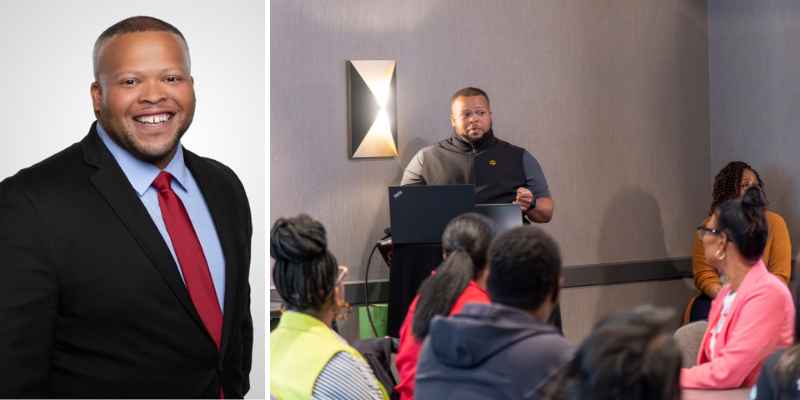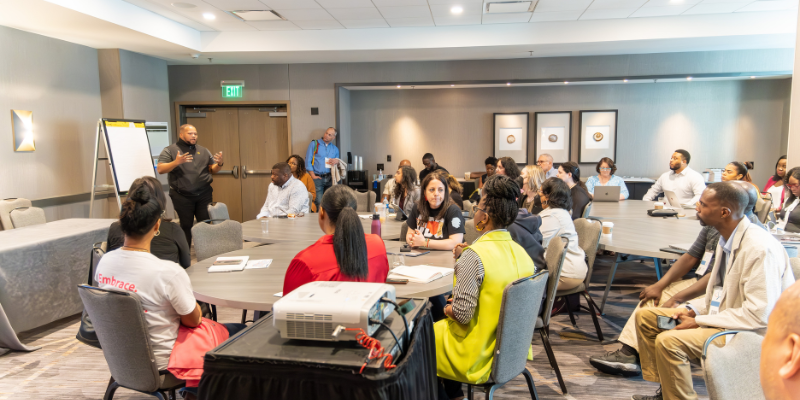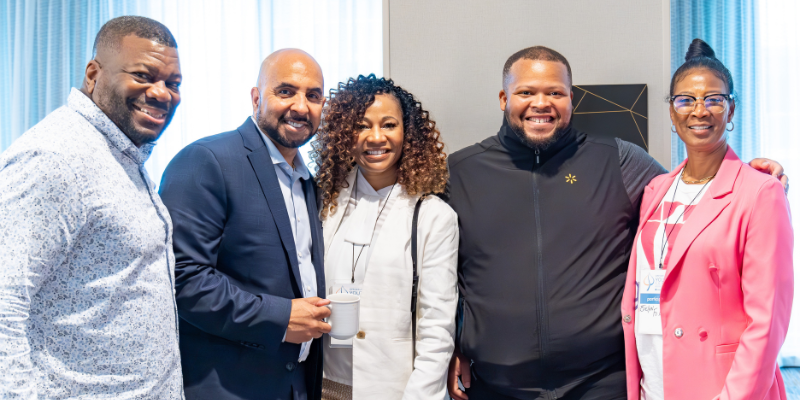Changing a System, Changing a Circumstance: The Spectrum of Philanthropy’s Impact
“I want to create a society where all of my neighbors can thrive... I think that is not only good for us individually, but it benefits corporations as well.”
Throughout his life, Dr. Marvin Carr has seen challenges not obstacles, but as catalysts for change. Despite growing up in the projects of southwest Detroit, Carr was undeterred by the supposed limitations on opportunity, financial mobility, and success. Crucially, he also was not alone.
“I wish I could say my journey began with me simply ‘pulling myself up by my bootstraps’ and working hard, but in fact, at every step, there was philanthropy that supported me,” says Carr, director of the Walmart.org Center for Racial Equity.
The most recent recipient of the Council on Foundations’ Outstanding Corporate Philanthropy Leadership Award, Carr is widely recognized for his leadership, courage, integrity, and tenacity. Having earned his doctorate and served as a Policy Advisor to the Chief Technology Officer of the United States, Carr’s story is one of triumph and paying it forward.

Marvin Carr is the Director of the Walmart Foundation’s Center for Racial Equity.
Philanthropy as an Agent for Growth
Carr's commitment to philanthropy is rooted in his own journey, throughout which he witnessed the power of people supporting one another. From his first-grade teacher, who paid for his field trip when his family could not, to the Bill and Melinda Gates Millennium scholarship that funded his academic pursuits, to the personal philanthropy of Freada and Mitch Kapor during his tenure as a White House fellow, Carr's trajectory was shaped by the support of others.
"At every juncture, philanthropy was my catalyst," Carr reflects. "My professional journey in research, policymaking, and philanthropy is to ensure that stories like mine are not exceptional but expected for young individuals from backgrounds like mine."
Determined to forge a corporate philanthropic strategy reflective of his lived experiences as a Black man in Detroit, he sought to address systemic inequities.
Driving Systemic Change
Walmart and the Walmart Foundation pledged $100 million over five years through the Walmart.org Center for Racial Equity to combat systemic racism. The center seeks to eliminate discrimination based on race within four focus areas – finance, health, education and criminal justice – and reflects an overarching philanthropic effort to embed equity across all investment portfolios.
At Walmart, Carr has channeled his energy into systemic reforms, particularly in preventing Black Americans from entering the criminal justice system.
“An essential aspect of our criminal justice theory of change involves encouraging other funders and policymakers to prioritize interventions that keep young Americans out of situations that lead to incarceration,” Carr explains.

Walmart Foundation's Dr. Marvin Carr presents at the Opportunity Youth Forum in Austin, TX, where over forty local collaborations gather to enhance outcomes for opportunity youth.
According to the Bureau of Justice Statistics, in 2018, the incarceration rate for Black Americans was more than five times higher than the rate for white Americans, and the Center focuses on young people at the highest risk, including those with incarcerated parents, survivors of trafficking, and former foster care recipients. They also invest in supporting research and building networks to help scale community-based prevention efforts.
“Prevention allows us to break the generational cycles of incarceration and is crucial for solving the inequitable experiences of Black and African Americans in the justice system,” Carr says.
Holistic and Data-driven Approach for Criminal Justice
In addition to prevention, the Walmart.org Center for Racial Equity, through Walmart and the Walmart Foundation, also focuses on grantmaking for research, advocacy, stakeholder outreach, and nonprofit capacity-building in support of individuals who have interacted with the justice system.
“While developing Walmart's and the Walmart Foundation's philanthropic strategy in criminal justice prevention, we noticed that youth programs aiming to serve a diverse range of young people often lack connections to experts in criminal justice prevention that they need to be effective,” Carr explains.
Carr stresses collaboration and promotes supporting networks of local leaders, youth, researchers, businesses, and policymakers that can work together to tackle criminal justice inequities. To that end, the Walmart.org Center for Racial Equity aims for significant change by backing initiatives that bridge gaps between youth-focused and criminal justice reform groups.
"My grantees and I focus heavily on data and facts and lean into outcomes over philosophical debates,” Carr adds.

Marvin Carr collaborates with other funding partners at the Opportunity Youth Forum in Austin, TX
For example, Walmart and the Walmart Foundation have awarded grants to organizations like the National Institute for Criminal Justice Reform to help increase capacity and develop juvenile programs within its National Offices of Violence Prevention Network. The Institute employs data-driven methods and evidence-based strategies to empower civic leaders and mayors in preventing incarceration, especially among at-risk youth.
In short, Carr believes philanthropy can pave the way for sustained success by investing in opportunities for all, ensuring a brighter future for communities and businesses alike – just as it did for him.
“I want to create a society where all of my neighbors can thrive,” Carr said. “I think that is not only good for us individually, but it benefits everyone.”



